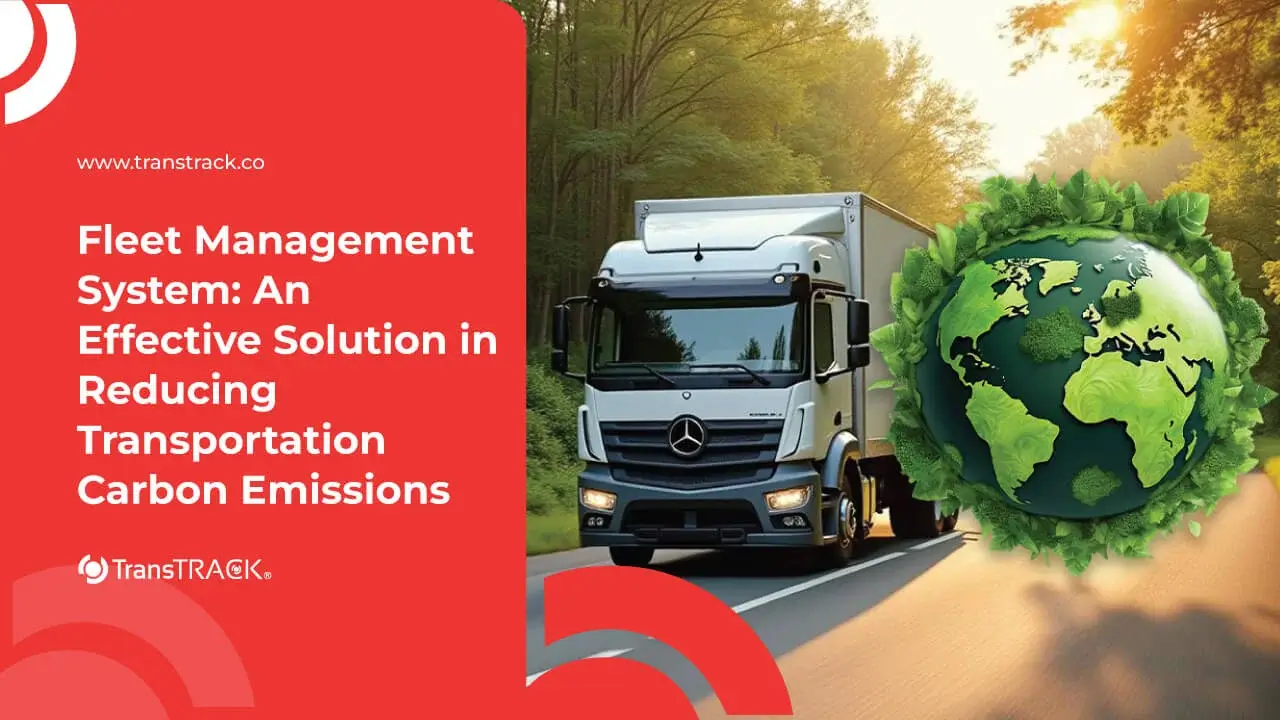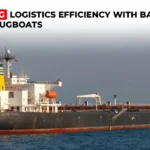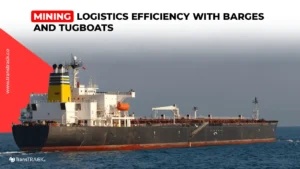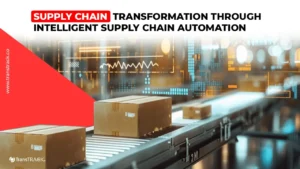Fleet Management System: An Effective Solution in Reducing Transportation Carbon Emissions
Posted on February 3, 2025 by Nur Wachda Mihmidati

Jakarta, as one of the most polluted cities in the world, faces a major challenge in reducing carbon emissions from the transportation sector. Data shows that more than 70% of air pollution in Jakarta comes from motor vehicles, driven by traffic congestion, high fuel consumption, and inefficient route planning. As a result, air quality continues to decline, impacting public health as well as increasing greenhouse gas emissions that accelerate climate change.
To solve this problem, various solutions are implemented, one of which is the use of Fleet Management System (FMS) from TransTRACK. This technology allows transportation and logistics companies to manage their fleets more efficiently through route optimization, fuel consumption monitoring, and driver behavior management. With FMS, companies can not only reduce operational costs, but also contribute to reducing their carbon footprint and creating a more sustainable transportation system.
Carbon Emissions in the Transportation Industry
The transportation industry is one of the main contributors to global carbon emissions, mainly from the burning of fossil fuels in land, sea and air vehicles. In big cities like Jakarta, the transportation sector contributes more than 70% of air pollution due to the high number of motor vehicles and severe congestion. Exhaust gases such as carbon dioxide (CO₂) and nitrogen oxides (NOₓ) not only accelerate climate change, but also adversely affect public health, including increased cases of respiratory diseases. In addition, high fuel consumption due to congestion leads to energy inefficiency and significant economic losses.
For example, Jakarta is facing an air pollution crisis that largely comes from motor vehicle emissions. To address this issue, the government has begun developing electric-based public transportation such as the MRT and electric buses, as well as encouraging the use of environmentally friendly vehicles. Other efforts include the implementation of odd-even policies, development of electric vehicle infrastructure, and promotion of alternative fuels. Nonetheless, the transition to sustainable transportation still faces major challenges, including high costs and infrastructure readiness. Therefore, collaboration between government, industry, and society is needed to effectively reduce carbon emissions in the transportation sector.
What are the main causes of high emissions in transportation
High emissions in transportation can have a negative impact on both the environment and our health. Here are the main causes of high emissions in transportation:
Fuel Combustion
Burning fossil fuels produces carbon dioxide (CO₂) and other pollutants that accelerate climate change. The higher the fuel consumption, the greater the emissions released. Case Study: Jakarta accounts for 70% of carbon emissions from land transportation. The government is starting to encourage the use of electric vehicles and biofuels to reduce the impact.
Vehicle Idling (Vehicle Idling with Engine Running)
Vehicles that stop but keep the engine running still produce emissions. This is common at red lights and in traffic jams, unnecessarily increasing fuel consumption. Case Study: In Jakarta, vehicles can spend 30% of travel time idling. Solutions implemented include smart transportation systems and odd-even policies.
Inefficient Route Planning
Non-optimal routes increase travel distance, fuel consumption, and emissions. Lack of public transportation integration exacerbates this condition. Case Study: Jakarta’s urban layout causes motorists to take frequent detours. Solutions included real-time navigation apps and integration of MRT, LRT, and TransJakarta.
Global and Local Regulations on Vehicle Emission Reduction
Here are some examples of regulations implemented in several countries regarding vehicle emission reduction.
Global Regulation
- Paris Agreement (2015) – Countries commit to reducing carbon emissions with the target of keeping global temperature rise below 2°C.
- Euro Emission Standards – The European Union implemented Euro regulations that limit vehicle emissions, with the latest standards (Euro 6/7) being more stringent on CO₂ and NOₓ.
- ZEV Mandate (California, USA) – A policy that requires vehicle manufacturers to sell a certain percentage of electric vehicles (Zero Emission Vehicles).
Local Regulation (Indonesia)
- Presidential Regulation No. 55/2019 – Encourages the acceleration of battery-based electric vehicles.
- Euro 4 Emission Standard – Applied since 2022 for gasoline and diesel vehicles to reduce air pollution.
- Odd-Even Policy (Jakarta) – Reduce the volume of private vehicles to reduce emissions and congestion.
Case Study: Electric Vehicle Implementation in Indonesia
The Indonesian government targets 2 million two-wheeled electric vehicles and 400 thousand four-wheeled ones by 2025. Subsidies are provided for electric vehicles, as well as tax incentives for manufacturers. However, key challenges such as high prices and limited charging infrastructure still hinder widespread adoption. This regulation is a first step in reducing transportation emissions and improving air quality.
How Fleet Management System Reduces Carbon Emissions
Fleet Management System (FMS) is a technology-based system that helps companies manage vehicle fleets efficiently. With advanced features such as route optimization, fuel consumption monitoring, and driver behavior management, FMS contributes significantly to reducing carbon emissions from the transportation sector.
Route Optimization and Mileage Reduction
FMS uses GPS and AI data to determine the fastest and most efficient routes, thereby reducing mileage, fuel consumption, and carbon emissions.
Fuel Consumption Monitoring and Management
This system records and analyzes fuel usage to identify wasteful patterns, provide savings recommendations, and detect potential vehicle leaks or inefficiencies.
Vehicle Idle Time Reduction
The FMS can monitor vehicles that are idling for too long, alerting the driver to turn off the engine when not needed to reduce emissions.
Driver Behavior Management to Reduce Emissions
The system analyzes driver behaviors such as excessive acceleration, sudden braking, and high speed that can increase fuel consumption and carbon emissions. Drivers are given training or warnings to drive more efficiently.
Predictive Maintenance for More Efficient Vehicles
FMS can detect early signs of vehicle damage, enabling preventive maintenance to maintain engine efficiency and reduce emissions caused by unmaintained vehicles.
Integration of Green Vehicles in Fleets
With data-driven analysis, FMS helps companies determine the right time to switch to electric or hybrid vehicles, and optimize the use of green vehicles in the fleet.
TransTRACK and its Role in Carbon Emission Reduction
TransTRACK, as an FMS solution provider, plays an important role in carbon emission reduction efforts with its IoT-based technology and data analytics. Its system enables transportation and logistics companies to:
- Track and optimize vehicle routes in real-time, reducing fuel consumption.
- Monitor driver behavior to ensure efficient and environmentally friendly vehicle operation.
- Manage fuel consumption and vehicle maintenance to maintain engine efficiency and reduce emissions.
- Help companies transition to electric or hybrid vehicles with data-driven planning.
With the implementation of FMS as offered by TransTRACK, the transportation industry can improve operational efficiency while contributing to the reduction of carbon emissions and environmental impacts.

Optimize your fleet, reduce emissions, and save costs with TransTRACK!
Use TransTRACK’s Fleet Management System (FMS) to manage your fleet more efficiently. With IoT-based technology and data analytics, you can:
- Reduce fuel consumption and carbon emissions
- Optimize routes and avoid congestion
- Monitoring driver behavior for maximum efficiency
- Perform timely vehicle maintenance for optimal performance
Be part of an eco-friendly transportation solution! <Contact us now and start your fleet transformation with TransTRACK!
Recent Post
Mining Logistics Efficiency with Barges and Tugboats
February 18, 2026Supply Chain Transformation through Intelligent Supply Chain Automation
February 17, 2026Topic :
fleet managementsustainabletechnology
 Bahasa Indonesia
Bahasa Indonesia









